Housing market stabilizing in Hungary
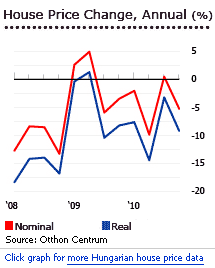
After two years of house price falls, the Hungarian housing market is now stabilizing. In the first quarter of 2011, house prices nationwide increased by 0.11% from the previous quarter, according to the FHB Bank. However, when adjusted for inflation, the house price index dropped by 1.12% over the same period.
On a year-on-year basis, house prices fell by 1.62% (-5.56% in real terms) y-o-y to Q1 2011, a large improvement from the 11.31% drop (-15.66% in real terms) seen during the year to Q4 2010.
In 2010, the number of real estate transactions dropped by 21% y-o-y to 72,000, showing sellers’ reluctance to lower their selling prices, according to FHB. Housing supply also started to fall in 2010, with dwelling construction permits falling 39%.
Mortgage-backed foreign currency lending was banned in August 2010, which could greatly affect the market, since loans denominated in foreign currencies are important. In 2010, total approved housing credits dropped by 26% from the previous year, due to tighter lending conditions and stricter mortgage issuance.
In 2010, Hungary’s modest economic growth of 1.21% (after a 6.69% GDP contraction in 2009) did little to boost housing demand. But FHB is quite optimistic that housing demand will increase this year as household income improves, and projects that house prices will rise by 2% in 2011. However this represents price stagnation, in real terms.
Inflation rose by 3.5% annually to June 2011 and is expected to moderate towards the central bank’s medium-term target of 3% this year. Meanwhile, unemployment slightly declined to 10.8% in April-June, from 11% in March-May 2011.
There are minor restrictions on foreigners buying property in Hungary. Foreigners need the approval of the Administrative Office (AOB) before they can buy property in Budapest. Most lawyers advise foreign nationals to set up a company registered in Hungary in order to purchase property. In this case no permit is needed.
The Swiss franc boom ends
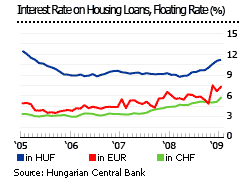
Despite the drop in housing loan subsidies, Hungary’s mortgage market grew strongly, from HUF 1.6 billion in 2003, to HUF4.09 billion in 2008, sustained, from 2004, by the entry of foreign-owned banks, and Swiss franc (CHF) denominated loans.
Swiss franc-denominated housing loans rose from HUF 124 billion in 2004, to HUF2.33 billion in 2008. The Swiss franc share of outstanding housing loans rose from 6% in 2004, to 57% in 2008.
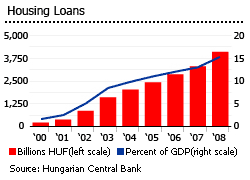
In 2006, the average interest rate for a floating CHF housing loan was 3.29% while the rate for a similar type mortgage was 9.13% for a HUF loan, and 4.3% for a euro-loan.
Then in October 2008 it ended. Swiss franc housing loans have been withdrawn. The value of foreign denominated housing loans, as measured in their original currency, has dropped.
Construction has slowed
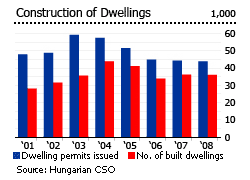
Construction has declined significantly, since the subsidy reductions, with permits down from a peak level of 59,241 dwellings in 2003, to an average of 44,300 dwellings from 2006 to 2008.
This was in contrast to early 2000, which saw a substantial increase in dwellings completed, from less than 25,000 annually (1998 to 2000), to 43,913 units in 2004, and 41,084 units in 2005, according to the Hungarian Central Statistics Office (CSO).
Budapest has been most severely affected by the recent slowdown, with construction volumes dropping by about 25% in 2008, from a year earlier.
A shift to Euro-denominated loans may somewhat save the housing market, as they have similar conditions and risk premiums to Swiss franc loans, but lower interest rates. But the net effect of the disappearance of Swiss franc loans will likely be to weaken the the mortgage market.
Foreign demand
Foreign demand for real estate in Budapest has greatly weakened. Demand from Spanish and Irish investors who account for up to 80% of total buyers, went down substantially reports Otthon Centrum, a real estate research firm. The number of transactions went down, the amount involved greatly reduced and the bargaining lengthened.
The first wave of post-opening foreigners bought in the 7th, 8th, and 9th Districts, which have a lot of historic charm. “Many foreigners bought investment apartments in 2001-2002,” says Andras Patkai of Budapestate.com.
“The foreigners bought in streets which often looked a mess, thinking these areas were beautiful but dirty,” says Patkai. “They imagined that the graffiti would be cleaned up and that they would look like Vienna. Well, the graffiti is still there and it doesn’t look like Vienna. It has taken much longer to clean these areas up than anyone imagined.”
“These were refurbished in a low quality, superficial way. This is no longer good enough!,” Patkai adds.
The supply of quality units is extremely limited to specific centres in the capital.
In July 2008, rental yields for Pest apartments averaged 5.6%, while Buda yields tailed slightly behind at 5.57%. Pest remains the city’s financial and commercial centre. Prices range from €82,240 on 40 sq.m. apartments, to €613,395 for 215 sq.m. apartments.
The Buda side of city is becoming a favorite of longer-term investors. With the market downturn, foreigners are tending to focus on university neighborhoods and high traffic areas, looking for used properties that can be refurbished.
A grim recession ahead
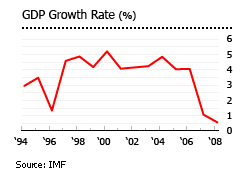
The fiscal deficit as a percentage of the GDP was successfully trimmed to 5.5% in 2007, and to 3.4% in 2008. Alas, this came with a huge cost to the economy. Economic growth was a mere 1.3% in 2007, down from average growth from 2000 to 2006 of 4.38%.
The global financial meltdown has pushed GDP growth further down to 0.5% in 2008. The economy was entered recession in 2009, with the GDP contracting by 6.5% by the end of the year. By the start of 2010, Hungary emerged from recession. The GDP grew by 0.20% in Q1 2010, and further increased by 0.80% in Q2 2010 from a year earlier.
Many measures have been implemented by the government to keep the budget deficit below 3% of GDP in 2009-2010. The limit on the deficit is part of the key Maastricht Treaty requirements for EU countries adopting the euro. Some of the measures are directed to the real estate industry. They include the elimination of energy subsidies for homeowners, and the introduction of additional real estate tax burdens for more expensive properties.